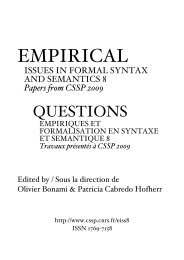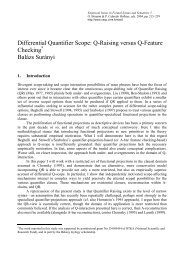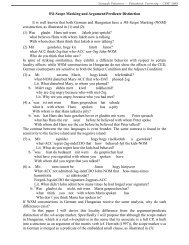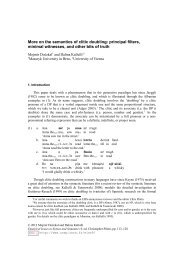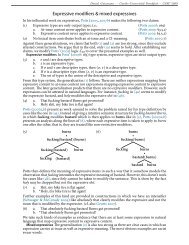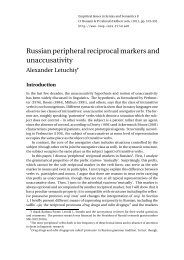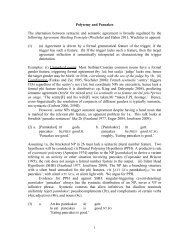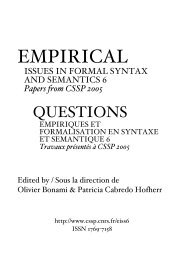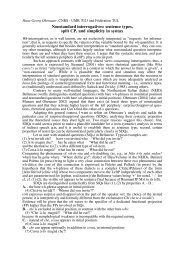Empirical Issues in Syntax and Semantics 9 (EISS 9 ... - CSSP - CNRS
Empirical Issues in Syntax and Semantics 9 (EISS 9 ... - CSSP - CNRS
Empirical Issues in Syntax and Semantics 9 (EISS 9 ... - CSSP - CNRS
Create successful ePaper yourself
Turn your PDF publications into a flip-book with our unique Google optimized e-Paper software.
some way. She notes that it is not felicitous to follow an imperative with an assertion that the<br />
realization of the content goes aga<strong>in</strong>st the speaker’s desires:<br />
(17) #Call him at home! I don’t want you to but he is f<strong>in</strong>e with that.<br />
This effect could be argued to follow from general pragmatic considerations for directive <strong>and</strong><br />
wish uses, but this is not possible for ‘dis<strong>in</strong>terested advice’ uses, as exemplified by (9). B can<br />
use the imperative even when it is mutually manifest that he does not share A’s goal. So <strong>in</strong> such<br />
cases there is no pragmatic basis to assume that the speaker has a desire for the addressee to<br />
take the tra<strong>in</strong>. However, even <strong>in</strong> these cases, the speaker cannot follow his piece of advice with<br />
a declaration that follow<strong>in</strong>g that advice goes aga<strong>in</strong>st his wishes:<br />
(18) A: How do I get <strong>in</strong>to the build<strong>in</strong>g?<br />
a. B: Officially, you are not allowed to but just go through this door.<br />
b. B: #I don’t want you to but just go through this door.<br />
c. B: The only way is through this door. But I don’t want you to go / you are not<br />
allowed to go through this door.<br />
In response to the question <strong>in</strong> (18), it is perfectly f<strong>in</strong>e to both give the <strong>in</strong>formation sought<br />
after <strong>and</strong> assert that the speaker does not want the addressee to act on this <strong>in</strong>formation (as<br />
is done <strong>in</strong> (18c)). However, as the <strong>in</strong>felicity of (18b) illustrates, this is not possible when the<br />
imperative is used. At the same time, the imperative is f<strong>in</strong>e even with a statement that act<strong>in</strong>g on<br />
the <strong>in</strong>formation is not permitted (as <strong>in</strong> (18a)).<br />
What are we to make of these observations? It seems that there is a bouletic component<br />
conventionally associated with imperatives. For if it were not conventional, we would expect<br />
this constra<strong>in</strong>t to be absent <strong>in</strong> scenarios <strong>in</strong> which the speaker can be assumed to not share the<br />
goals of the addressee, as <strong>in</strong> dis<strong>in</strong>terested advice uses.<br />
Schwager (2006:166) reduces the apparent requirement for a bouletic component, evidenced<br />
by (17), to speaker endorsement, employ<strong>in</strong>g advice uses to tease the two apart. Her argument<br />
is that s<strong>in</strong>ce <strong>in</strong> advice uses the speaker is dis<strong>in</strong>terested <strong>in</strong> the addressee’s future behavior, the<br />
speaker cannot be said to actively want the content of the imperative to be realized. She proposes<br />
to capture this conventional effect <strong>in</strong> terms of a felicity condition on uses of imperatives:<br />
(19) The speaker affirms the order<strong>in</strong>g source. (Therefore, he considers it to be better (sometimes<br />
with respect to a contextually salient goal) that the proposition modalized by the<br />
imperative operator comes out true.)<br />
One way to make this formulation more precise is to <strong>in</strong>terpret ‘considers it to be better’ as<br />
‘prefers it to its negation’, <strong>in</strong> a bouletic sense. This construal has the added advantage of predict<strong>in</strong>g<br />
the consistency constra<strong>in</strong>t discussed <strong>in</strong> the previous section. But it is too strong for<br />
dis<strong>in</strong>terested advice, as <strong>in</strong> (9), for which all that is necessary is that the speaker does not have<br />
a desire aga<strong>in</strong>st the realization of the content. Kaufmann <strong>and</strong> Schwager (2009) <strong>in</strong> fact propose<br />
the weaker alternative <strong>in</strong> (20).<br />
(20) The negation of the prejacent does not follow from what is optimal with respect to the<br />
speaker’s wishes.<br />
(20) will trivially be fulfilled <strong>in</strong> normal contexts for directive uses, <strong>and</strong> it will ensure that imperatives<br />
can only be used for advice if the speaker (m<strong>in</strong>imally) does not care whether the prejacent<br />
42



